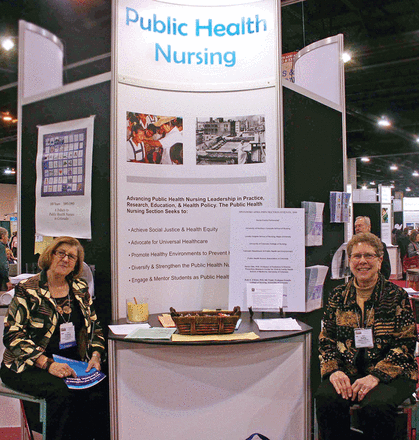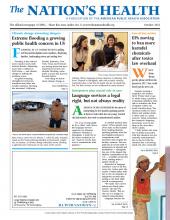
Members of the Public Health Nursing Section gather for a photo during a meeting at APHA headquarters in 2016.
Photo by The Nation’s Health
For 100 years, APHA’s Public Health Nursing Section has been dedicated in its mission.Started at a time when preventive care was still in its infancy, the Section has helped support generations of public health nurses while simultaneously becoming a national voice of advocacy.
“We’re interested in enhancing the visibility of public health nursing not only in health care writ large, but also so that all nurses understand what public health nurses do,” said Rita Munley Gallagher, PhD, RN, FFNMRCSI, a 40-year Section member and current treasurer and chair of the Section’s Centennial Committee. “We work diligently to make public health nurses’ voices known and the role understood.”

A Section member speaks at a Public Health Nursing Section meeting in 2014.
Photo by The Nation’s Health
The Public Health Nursing Section was created in 1923, 51 years after APHA began. Its early work included leadership on major public health issues of the day, including life expectancy, child care and infectious diseases such as tuberculosis, typhoid fever and smallpox.
During the World War II era and the 1950s, demand increased for public health nursing services in the military, factories and communities. The APHA Section met the challenge with workforce training and public policy advocacy. Section members were also early advocates for Medicare and Medicaid.
In recent decades, the Section has worked to improve health education and screening on chronic conditions such as cardiovascular disease, diabetes and cancer, and on efforts to stem the opioid crisis.
“This is what public health nurses have been historically prepared to do — provide effective, efficient care to the people in the communities that we are serving,” Gallagher told The Nation’s Health.
The Section has had an impact both within and beyond APHA, with eight members elected president of the Association. It has also been part of landmark documents that have guided the field, defining the role of public health nursing, developing competencies and examining social determinants through the lens of the profession.
“We are able to take the best from nursing and take it into the community,” Cynthia Stone, PhD, MSN, RN, a past Section chair, told The Nation’s Health.
Striving for diversity in the field remains a hallmark of the Section, but work remains. While Black registered nurses have increased in recent years, the number of Hispanic registered nurses is disproportionately low compared to the U.S. Hispanic population, according to the National Academy of Medicine.

Members strategize on Section work during a meeting in 2012 in Washington, D.C.
Photo by The Nation’s Health
“Informing health-related public policy can involve communicating about health disparities and social determinants of health with the public, policymakers and organizational leaders, focusing on both challenges and solutions for addressing health through actions targeted to achieving health equity,” Gallagher said.
With 100 years of progress under its belt, Public Health Nursing Section members are hopeful of the future.
“We are still relevant, and over the next decades we need to be an even stronger voice for the public’s health,” Stone said.
The Section chose “Promoting and Protecting the Health of Populations” as the theme for its centennial, which will be celebrated with events at APHA’s 2023 Annual Meeting and Expo. On Sunday, Nov. 12, from 4 to 6:30 p.m., the Centennial Committee will host “Public Health Nursing Section, Historical Presentation and Reception,”a ticketed anniversary event that is open to all.

Public Health Nursing Section members greet visitors at the Section’s booth at APHA’s 2010 Annual Meeting and Expo.
Photo by The Nation’s Health
For more information on the Public Health Nursing Section, visit www.apha.org/phn-section. For more on the Section’s Annual Meeting events, see the online program at www.apha.org/annualmeeting.
- Copyright The Nation’s Health, American Public Health Association









